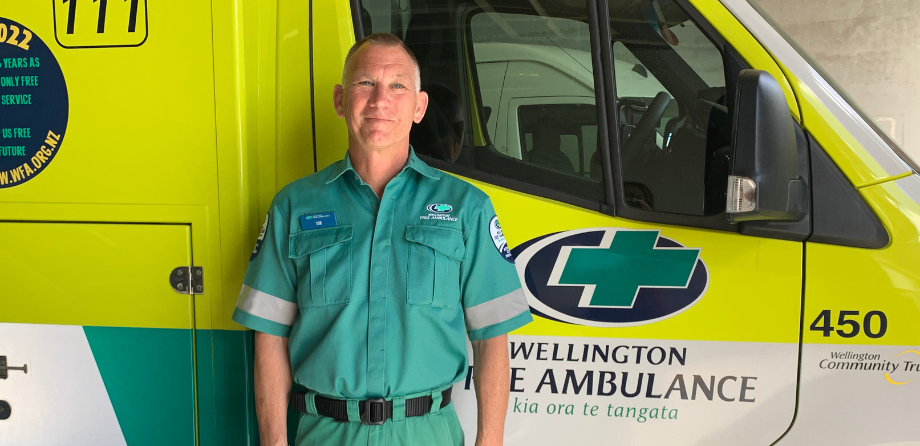About us
Our news
Meet Tor - 42 Years As A Paramedic
Meet Tor - 42 Years As A Paramedic
 02 November 2022
02 November 2022
Meet Tor - 42 Years As A Paramedic
Since 1927, Wellington Free Ambulance has been here for our community, through the good times and the tough times. We were here during the World War II years, we were here during the Wahine disaster, the Christchurch earthquakes and the COVID pandemic – and we are still here for everyone in the region, every day, whenever they need us.

42 years ago, Tor joined Wellington Free Ambulance - which means he has worked here for almost half our service’s lifespan!
His role as an Intensive Care Paramedic sees him attend accidents and emergencies, and administer advanced pre-hospital treatments to critically unwell or injured patients.
Before he joined Wellington Free, Tor had been working in a bank. From 1977 to 1980 he was also volunteering for the ambulance service as auxiliary staff on Friday nights.
“Back then, most ambulances were single crewed,” remembers Tor. “But then Cabinet announced limited funding for double crewing of ambulances, which meant Wellington Free Ambulance could recruit eight new full time staff. I joined in September 1980 and have been on the road ever since!”
A lot has changed since then.
“The training was very different when I first joined,” recalls Tor. “We only got on-the-job training.”
“I remember how frightening it was at the start. You could have a patient who was really sick, and you didn’t always have the equipment or manpower or pharmacological knowledge, but you knew that without you this person might die. The ambulances were single crewed back then and you had to make important life or death decisions on your own.”
Today things are very different. To work as a paramedic, you begin with a Bachelor of Health Science (Paramedicine) degree, following which successful graduates spend a year practicing their skills under the guidance of a trained mentor. Tor is a big advocate for today’s education, training and paramedic registration processes, and was one of New Zealand’s first Paramedicine degree students.
“In around 2000, I saw some flyers advertising online study through Victoria University Melbourne, for a BHSc in Paramedicine,” recalls Tor. “I decided to apply along with another colleague.”
While he was studying, the leadership team at Wellington Free Ambulance and Ambulance NZ asked Tor to come and talk to them about the degree. “It was 2001 and they were thinking of bringing the course to New Zealand,” remembers Tor.
Very soon afterwards, Victoria University Melbourne began delivering the degree course at Porirua Station, but eventually Whitireia took it over.
“The students and graduates from Whitireia are incredible,” says Tor. “They are 20 or 21 years old and they come out on the road with us and get involved in sudden cardiac arrests and traumas and life-threatening issues, they see patients facing death. They cope so well – and they come back the next day and do it all again, with a sense of pride. Their resilience is so inspiring.”
“Being an ambulance officer is a much more complex job now,” says Tor. “We have a lot more knowledge of pharmacology, anatomy and physiology, there are more drugs we can administer and we have to do a lot more decision making. Over the last 42 years it has been amazing to see our skills and equipment advance so much.”
Another important change since Tor’s career began is that all emergency ambulances are now double crewed.
“It means at least one paramedic is always free to provide treatment. Assessing and treating patients takes time. It can take an hour to assess the patient, administer treatment and make sure they are safe. There can easily be a couple of hundred decisions to make for one patient.”
One Tor’s career highlights is working as a paramedic preceptor (mentor) to graduates during their first year on the road.
“It’s been so rewarding,” says Tor. “When I see someone at the start, asking lots of questions, sometimes feeling overwhelmed, it’s amazing to guide them and help them learn to be independent and confident. I try to inspire them and pass on my knowledge.”
“I’m very proud to work at Wellington Free Ambulance, because we achieve clinical excellence across the board, and we have a reputation for that. Our team is highly qualified and highly skilled. We’ve been published in overseas journals, our staff present papers at overseas conferences. We attract staff from the UK, Australia, all over the world. They come to us because they see our high clinical standards.”
“I’ve been working at Wellington Free Ambulance for 42 years simply because it’s the best ambulance service in the country.”
If you, or someone you know, are interested in becoming a Paramedic, please click here for further information.